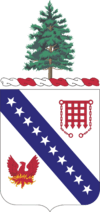240th Coast Artillery (United States) facts for kids
Quick facts for kids 240th Coast Artillery Regiment |
|
|---|---|

Coat of Arms
|
|
| Active | 1924 – 1944 |
| Country | |
| Branch | Army |
| Type | Coast artillery |
| Role | Harbor defense |
| Size | Regiment |
| Part of | Harbor Defenses of Portland |
| Garrison/HQ | |
| Motto(s) | Semper Primus et Fidelis, "Always First and Faithful." |
| Mascot(s) | Oozlefinch |
The 240th Coast Artillery Regiment was a special military group in the United States Army Coast Artillery Corps. This group was part of the Maine Army National Guard, which is like a state-level army.
Their main job was to protect the coast around Portland, Maine. They were active from 1924 to 1944. They helped guard the important area known as the Harbor Defenses of Portland.
Contents
What Was the 240th Coast Artillery?
The 240th Coast Artillery was officially formed on April 16, 1924. It was the part of the Maine National Guard that helped defend the harbors of Portland. Another group, the 8th Coast Artillery, was the regular U.S. Army unit working alongside them.
The main base for the 240th was in Portland, Maine. A veteran from World War I, Colonel George E. Fogg, led the regiment for many years, starting in 1924.
In October 1944, the regiment was split into two smaller groups called battalions. This was part of a bigger change happening across the entire U.S. Army.
Where Did They Serve?
The 240th Coast Artillery was called into federal service on September 16, 1940. This meant they became part of the active U.S. Army. Their headquarters first moved to Fort McKinley and then to Fort Williams.
From December 1941 to February 1943, one of their groups, Battery F, operated large 155 mm guns. These guns were placed at the Biddeford Pool Military Reservation to protect the coast.
As new, more powerful gun batteries were built, like a huge 16-inch gun at Peaks Island, fewer soldiers were needed. Because of this, some parts of the regiment were closed down.
On October 7, 1944, the regiment was divided into two new groups: the 185th and 186th Coast Artillery Battalions. These battalions were later deactivated on April 1, 1945.
Their History and Legacy
The history of the 240th Coast Artillery goes way back to the 1st Maine Volunteer Infantry Regiment. This older group was formed in 1854, making it one of the oldest military organizations in Maine.
Many military units in Maine, including the 240th Coast Artillery, have a connection to this very first Maine regiment. Today, this long history is carried on by the 240th Regional Training Institute, which is part of the Maine Army National Guard.
The 240th Coast Artillery is also considered an "ancestor" unit of the modern-day 133rd Engineer Battalion of the Maine Army National Guard. Another famous ancestor unit is the 20th Maine Volunteer Infantry Regiment.
Understanding Their Coat of Arms
The 240th Coast Artillery had a special symbol called a Coat of Arms. It helped tell their story.
Their motto was "Semper Primus et Fidelis." This means "Always First and Faithful."
Symbols on the Shield
- Portcullis: This is a strong gate that used to block the entrance to old forts. Its red color shows that the unit was artillery, meaning they used big guns.
- Phoenix: This mythical bird is a symbol of the City of Portland. It represents the city rising again after being destroyed by fire three times in history. It also shows how the regiment was "reborn" after different wars.
- Stars: Ten stars cross the shield. They stand for the ten major battles the regiment fought in.
- Blue Band: The blue band behind the stars shows that the regiment sometimes served as infantry, especially during the Civil War. Infantry are soldiers who fight on foot.
The Crest
- Pine Tree: The pine tree on top of the shield represents Maine, which is known as the "Pine Tree State."
 | Aaron Henry |
 | T. R. M. Howard |
 | Jesse Jackson |

